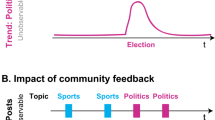Abstract
Social media users make decisions about what content to post and read. As posted content is often visible to others, users are likely to impose self-censorship when deciding what content to post. On the other hand, such a concern may not apply to reading social media content. As a result, the topics of content that a user posted and read can be different and this has major implications to the applications that require personalization. To better determine and profile social media users’ topic interests, we conduct a user survey in Twitter. In this survey, participants chose the topics they like to post (posting topics) and the topics they like to read (reading topics). We observe that users’ posting topics differ from their reading topics significantly. We find that some topics such as “Religion”, “Business” and “Politics” attract much more users to read than to post. With the ground truth data obtained from the survey, we further explore the discovery of users’ posting and reading topics separately using features derived from their posted content, received content and social networks.
Access this chapter
Tax calculation will be finalised at checkout
Purchases are for personal use only
Similar content being viewed by others
Notes
- 1.
Twitter accounts are considered as personal identifiable information, so we can not use Amazon Mechanical Turk (AMT) for conducting this survey. The restrictions of using AMT: https://requester.mturk.com/help/faq#restrictions_use_mturk.
References
Balasubramanian, S., Mahajan, V.: The economic leverage of the virtual community. Int. J. Electron. Commer. 5(3), 103–138 (2001)
Benevenuto, F., Rodrigues, T., Cha, M., Almeida, V.: Characterizing user behavior in online social networks. In: IMC (2009)
Bhattacharya, P., Zafar, M.B., Ganguly, N., Ghosh, S., Gummadi, K.P.: Inferring user interests in the twitter social network. In: RecSys (2014)
Chen, J., Hsieh, G., Mahmud, J.U., Nichols, J.: Understanding individuals’ personal values from social media word use. In: CSCW (2014)
Das, S., Kramer, A.: Self-censorship on Facebook. In: ICWSM (2013)
Davidson, J., Liebald, B., Liu, J., Nandy, P., Van Vleet, T., Gargi, U., Gupta, S., He, Y., Lambert, M., Livingston, B., Sampath, D.: The youtube video recommendation system. In: RecSys (2010)
Diao, Q., Jiang, J.: A unified model for topics, events and users on Twitter. In: EMNLP (2013)
Ghosh, S., Sharma, N., Benevenuto, F., Ganguly, N., Gummadi, K.: Cognos: crowdsourcing search for topic experts in microblogs. In: SIGIR (2012)
Gong, W., Lim, E.P., Zhu, F.: Characterizing silent users in social media communities. In: ICWSM (2015)
Hampton, K., Rainie, L., Lu, W., Dwyer, M., Shin, I., Purcell, K.: Social media and the “spiral of silence”. Pew Research Internet Project (2014). http://www.pewinternet.org/2014/08/26/social-media-and-the-spiral-of-silence/
Hong, L., Bekkerman, R., Adler, J., Davison, B.D.: Learning to rank social update streams. In: SIGIR (2012)
Hsieh, G., Chen, J., Mahmud, J.U., Nichols, J.: You read what you value: understanding personal values and reading interests. In: CHI (2014)
Kosinski, M., Stillwell, D., Graepel, T.: Private traits and attributes are predictable from digital records of human behavior. PNAS 110(15), 5802–5850 (2013)
Kouloumpis, E., Wilson, T., Moore, J.: Twitter sentiment analysis: the good the bad and the OMG! In: ICWSM (2011)
Kulshrestha, J., Zafar, M.B., Noboa, L.E., Gummadi, K.P., Ghosh, S.: Characterizing information diets of social media users. In: ICWSM (2015)
Lebanon, G., Lafferty, J.D.: Cranking: combining rankings using conditional probability models on permutations. In: ICML (2002)
Li, X., Guo, L., Zhao, Y.E.: Tag-based social interest discovery. In: WWW (2008)
Linden, G., Smith, B., York, J.: Amazon. com recommendations: item-to-item collaborative filtering. IEEE Internet Comput. 7(1), 76–80 (2003)
Michelson, M., Macskassy, S.A.: Discovering users’ topics of interest on twitter: a first look. In: AND (2010)
Nonnecke, B., Preece, J.: Lurker demographics: counting the silent. In: CHI (2000)
Pak, A., Paroubek, P.: Twitter as a corpus for sentiment analysis and opinion mining. In: LREC (2010)
Sleeper, M., Balebako, R., Das, S., McConahy, A.L., Wiese, J., Cranor, L.F.: The post that wasn’t: exploring self-censorship on facebook. In: CSCW (2013)
Spasojevic, N., Yan, J., Rao, A., Bhattacharyya, P.: Lasta: large scale topic assignment on multiple social networks. In: KDD (2014)
Tagarelli, A., Interdonato, R.: “Who’s out there?”: identifying and ranking lurkers in social networks. In: ASONAM (2013)
Wang, G., Konolige, T., Wilson, C., Wang, X., Zheng, H., Zhao, B.Y.: You are how you click: clickstream analysis for Sybil detection. In: SEC (2013)
Xu, Z., Ru, L., Xiang, L., Yang, Q.: Discovering user interest on twitter with a modified author-topic model. In: WI-IAT (2011)
Yang, Z., Xu, J., Li, X.: Data selection for user topic model in twitter-like service. In: ICPADS (2011)
Zhao, W.X., Jiang, J., Weng, J., He, J., Lim, E.-P., Yan, H., Li, X.: Comparing Twitter and traditional media using topic models. In: Clough, P., Foley, C., Gurrin, C., Jones, G.J.F., Kraaij, W., Lee, H., Mudoch, V. (eds.) ECIR 2011. LNCS, vol. 6611, pp. 338–349. Springer, Heidelberg (2011)
Acknowledgments
The authors gratefully thank Ingmar Weber for the inspiring discussion. This research is supported by the Singapore National Research Foundation under its International Research Centre @ Singapore Funding Initiative and administered by the IDM Programme Office, Media Development Authority (MDA).
Author information
Authors and Affiliations
Corresponding author
Editor information
Editors and Affiliations
Rights and permissions
Copyright information
© 2016 Springer International Publishing Switzerland
About this paper
Cite this paper
Gong, W., Lim, EP., Zhu, F. (2016). Posting Topics \(\ne \) Reading Topics: On Discovering Posting and Reading Topics in Social Media. In: Wierzbicki, A., Brandes, U., Schweitzer, F., Pedreschi, D. (eds) Advances in Network Science. NetSci-X 2016. Lecture Notes in Computer Science(), vol 9564. Springer, Cham. https://doi.org/10.1007/978-3-319-28361-6_2
Download citation
DOI: https://doi.org/10.1007/978-3-319-28361-6_2
Published:
Publisher Name: Springer, Cham
Print ISBN: 978-3-319-28360-9
Online ISBN: 978-3-319-28361-6
eBook Packages: Computer ScienceComputer Science (R0)




